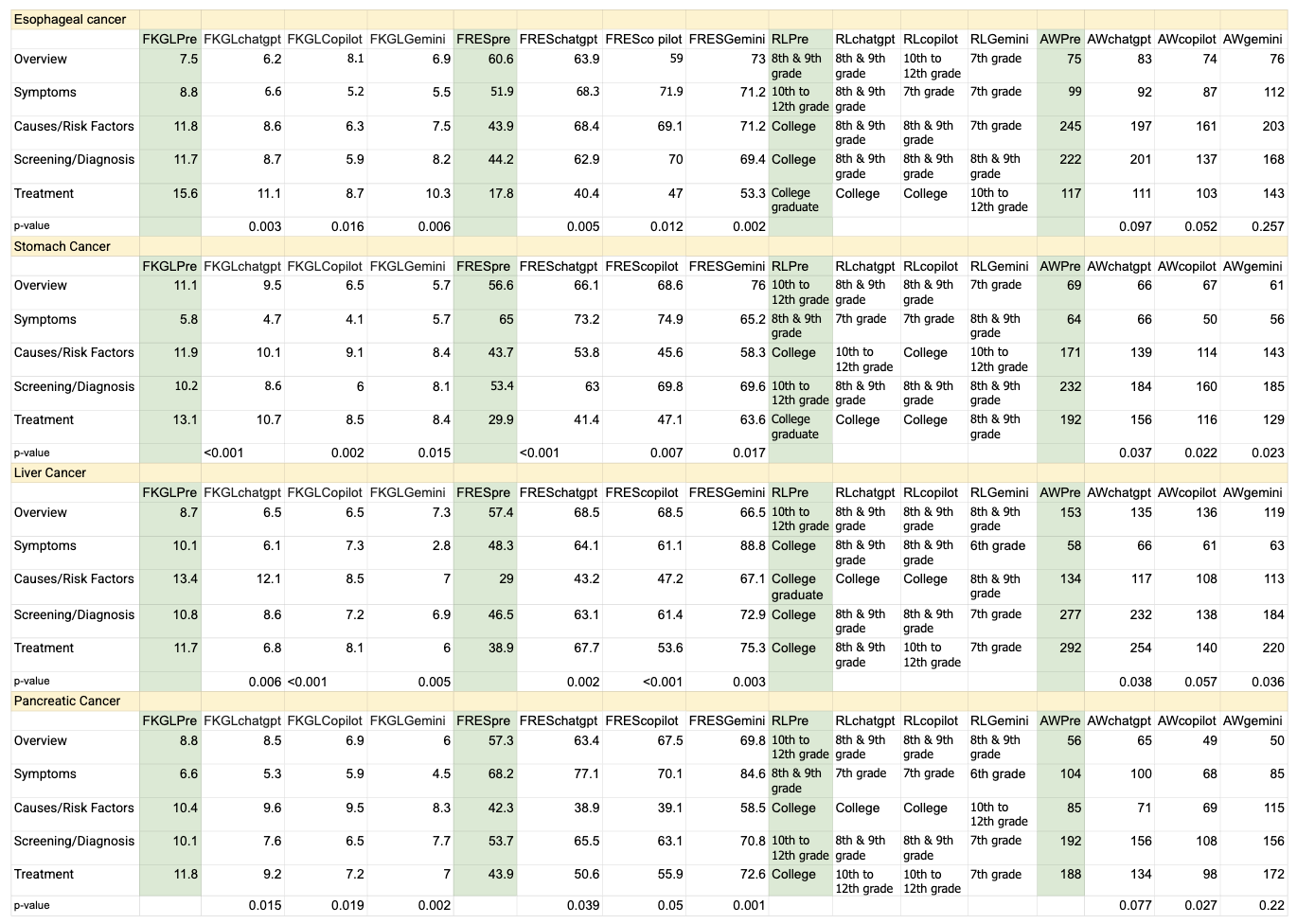Sunday Poster Session
Category: Practice Management
P1912 - Transforming Gastrointestinal Cancer Care Through Artificial Intelligence: Breaking Barriers With Patient-Friendly Education
Sunday, October 26, 2025
3:30 PM - 7:00 PM PDT
Location: Exhibit Hall
- PS
Prakhyath Srikaram, MD (he/him/his)
Baptist Memorial Hospital-North Mississippi
Oxford, Mississippi
Presenting Author(s)
Pujitha Vallivedu Chennakesavulu, MD, MBBS1, Sushrut Ingawale, MD, DNB, MBBS2, Prakhyath Srikaram, MD3, Rineetha Tandra, MD, MBBS4, Archit Garg, MD5, Akshay Sharma, MBBS6, Charitha Karanam Ramapathy, MD7, Preethi Jagannath, MBBS8, Matthew Antony. Manoj, MBBS9, Simran Joshi, MD10, Marquise Soto, MD11, Corinne Caissie, MD10, Jeevin Singh Sandhu, DO12, Prabin Sharma, MD13
1Quinnipiac University Frank H Netter School of Medicine/ St Vincent medical center, Bridgeport, CT; 2Quinnipiac University - Frank H Netter MD School of Medicine, Bridgeport, CT; 3Baptist Memorial Hospital-North Mississippi, Oxford, MS; 4Baton Rouge General Medical Center, Baton Rogue, LA; 5Saint Peter's University Hospital / Rutgers Robert Wood Johnson Medical School, New Brunswick, NJ; 6Luminis Health Anne Arundel Medical Center, Annapolis, MD; 7UAB Montgomery, Montgomery, AL; 8Mount Auburn Hospital, Cambridge, MA; 9Beth Israel Deaconess Medical Center, Boston, MA; 10Yale New Haven Health, Bridgeport Hospital, Bridgeport, CT; 11Massachusetts General Hospital, Chelsea, MA; 12Methodist Dallas Medical Center, Dallas, TX; 13Quinnipiac University - St VIncent Medical Center, Bridgeport, CT
Introduction: The global burden of gastrointestinal (GI) cancer is significant, accounting for 26% of global cancer incidence and nearly 35% of cancer-related mortality. Effective patient education is crucial in managing GI cancers. Recently, Artificial Intelligence (AI) has revolutionized medicine, enhancing diagnostics, personalized care, and research. However, despite the availability of educational content from reputable professional societies, none are tailored to patient literacy levels. We attempted to increase awareness by using AI tools—ChatGPT (OpenAI), Copilot (Microsoft), and Gemini (Google)—to deliver complex information to patients with low health literacy.
Methods: A questionnaire for patient education resources on esophageal, gastric, hepatocellular, and pancreatic cancers, sourced from the American College of Gastroenterology website. We utilized various AI tools - ChatGPT, Copilot, and Gemini to simplify to the reading level < 6th grade. The responses were analyzed using the Flesch-Kincaid Grade Level (FKGL), Flesch Reading Ease Score (FRES), Reading Level (RL), and average words (AW) per sentence. Statistical significance was determined by paired t-test with P value < 0.05.
Results: FKGL indicates the U.S. school grade level required to understand a text, while FRES measures readability on a scale from 0 (very difficult) to 100 (very easy). All three AI tools have shown significant differences in FKGL and FRES scores in all GI cancers. The difference noted in the AW count is variable across different AI tools and GI cancers. The average RL of the original education material is at the level of Grade 10th grade to college. ChatGPT and Copilot have simplified it to the Grade 8 to 9th grade, whereas Gemini to 6 to 7th grade.
Discussion: AI tools effectively simplify medical information on GI cancers, improving accessibility and comprehensibility for individuals with varying literacy levels. The modifications made by ChatGPT, CoPilot, and Gemini showed statistically significant differences (p < 0.05), indicating successful text simplification. No AI tool demonstrated greater effectiveness, as all were equally effective in simplifying the text. Demonstrated that AI can deliver powerful, audience-tailored insights by turning complexity into clarity.

Figure: Comparison of readability and accessibility metrics for esophageal, stomach, liver, and pancreatic cancer educational content before and after AI tool intervention. Metrics include: FKGL (Flesch-Kincaid Grade Level), FRES (Flesch Reading Ease Score), RL (Reading Level), AW (Average Word Count), Pre (Original/pre-intervention), and ChatGPT, Copilot, Gemini (Versions generated by respective AI tools)
Disclosures:
Pujitha Vallivedu Chennakesavulu indicated no relevant financial relationships.
Sushrut Ingawale indicated no relevant financial relationships.
Prakhyath Srikaram indicated no relevant financial relationships.
Rineetha Tandra indicated no relevant financial relationships.
Archit Garg indicated no relevant financial relationships.
Akshay Sharma indicated no relevant financial relationships.
Charitha Karanam Ramapathy indicated no relevant financial relationships.
Preethi Jagannath indicated no relevant financial relationships.
Matthew Manoj indicated no relevant financial relationships.
Simran Joshi indicated no relevant financial relationships.
Marquise Soto indicated no relevant financial relationships.
Corinne Caissie indicated no relevant financial relationships.
Jeevin Singh Sandhu indicated no relevant financial relationships.
Prabin Sharma indicated no relevant financial relationships.
Pujitha Vallivedu Chennakesavulu, MD, MBBS1, Sushrut Ingawale, MD, DNB, MBBS2, Prakhyath Srikaram, MD3, Rineetha Tandra, MD, MBBS4, Archit Garg, MD5, Akshay Sharma, MBBS6, Charitha Karanam Ramapathy, MD7, Preethi Jagannath, MBBS8, Matthew Antony. Manoj, MBBS9, Simran Joshi, MD10, Marquise Soto, MD11, Corinne Caissie, MD10, Jeevin Singh Sandhu, DO12, Prabin Sharma, MD13. P1912 - Transforming Gastrointestinal Cancer Care Through Artificial Intelligence: Breaking Barriers With Patient-Friendly Education, ACG 2025 Annual Scientific Meeting Abstracts. Phoenix, AZ: American College of Gastroenterology.
1Quinnipiac University Frank H Netter School of Medicine/ St Vincent medical center, Bridgeport, CT; 2Quinnipiac University - Frank H Netter MD School of Medicine, Bridgeport, CT; 3Baptist Memorial Hospital-North Mississippi, Oxford, MS; 4Baton Rouge General Medical Center, Baton Rogue, LA; 5Saint Peter's University Hospital / Rutgers Robert Wood Johnson Medical School, New Brunswick, NJ; 6Luminis Health Anne Arundel Medical Center, Annapolis, MD; 7UAB Montgomery, Montgomery, AL; 8Mount Auburn Hospital, Cambridge, MA; 9Beth Israel Deaconess Medical Center, Boston, MA; 10Yale New Haven Health, Bridgeport Hospital, Bridgeport, CT; 11Massachusetts General Hospital, Chelsea, MA; 12Methodist Dallas Medical Center, Dallas, TX; 13Quinnipiac University - St VIncent Medical Center, Bridgeport, CT
Introduction: The global burden of gastrointestinal (GI) cancer is significant, accounting for 26% of global cancer incidence and nearly 35% of cancer-related mortality. Effective patient education is crucial in managing GI cancers. Recently, Artificial Intelligence (AI) has revolutionized medicine, enhancing diagnostics, personalized care, and research. However, despite the availability of educational content from reputable professional societies, none are tailored to patient literacy levels. We attempted to increase awareness by using AI tools—ChatGPT (OpenAI), Copilot (Microsoft), and Gemini (Google)—to deliver complex information to patients with low health literacy.
Methods: A questionnaire for patient education resources on esophageal, gastric, hepatocellular, and pancreatic cancers, sourced from the American College of Gastroenterology website. We utilized various AI tools - ChatGPT, Copilot, and Gemini to simplify to the reading level < 6th grade. The responses were analyzed using the Flesch-Kincaid Grade Level (FKGL), Flesch Reading Ease Score (FRES), Reading Level (RL), and average words (AW) per sentence. Statistical significance was determined by paired t-test with P value < 0.05.
Results: FKGL indicates the U.S. school grade level required to understand a text, while FRES measures readability on a scale from 0 (very difficult) to 100 (very easy). All three AI tools have shown significant differences in FKGL and FRES scores in all GI cancers. The difference noted in the AW count is variable across different AI tools and GI cancers. The average RL of the original education material is at the level of Grade 10th grade to college. ChatGPT and Copilot have simplified it to the Grade 8 to 9th grade, whereas Gemini to 6 to 7th grade.
Discussion: AI tools effectively simplify medical information on GI cancers, improving accessibility and comprehensibility for individuals with varying literacy levels. The modifications made by ChatGPT, CoPilot, and Gemini showed statistically significant differences (p < 0.05), indicating successful text simplification. No AI tool demonstrated greater effectiveness, as all were equally effective in simplifying the text. Demonstrated that AI can deliver powerful, audience-tailored insights by turning complexity into clarity.

Figure: Comparison of readability and accessibility metrics for esophageal, stomach, liver, and pancreatic cancer educational content before and after AI tool intervention. Metrics include: FKGL (Flesch-Kincaid Grade Level), FRES (Flesch Reading Ease Score), RL (Reading Level), AW (Average Word Count), Pre (Original/pre-intervention), and ChatGPT, Copilot, Gemini (Versions generated by respective AI tools)
Disclosures:
Pujitha Vallivedu Chennakesavulu indicated no relevant financial relationships.
Sushrut Ingawale indicated no relevant financial relationships.
Prakhyath Srikaram indicated no relevant financial relationships.
Rineetha Tandra indicated no relevant financial relationships.
Archit Garg indicated no relevant financial relationships.
Akshay Sharma indicated no relevant financial relationships.
Charitha Karanam Ramapathy indicated no relevant financial relationships.
Preethi Jagannath indicated no relevant financial relationships.
Matthew Manoj indicated no relevant financial relationships.
Simran Joshi indicated no relevant financial relationships.
Marquise Soto indicated no relevant financial relationships.
Corinne Caissie indicated no relevant financial relationships.
Jeevin Singh Sandhu indicated no relevant financial relationships.
Prabin Sharma indicated no relevant financial relationships.
Pujitha Vallivedu Chennakesavulu, MD, MBBS1, Sushrut Ingawale, MD, DNB, MBBS2, Prakhyath Srikaram, MD3, Rineetha Tandra, MD, MBBS4, Archit Garg, MD5, Akshay Sharma, MBBS6, Charitha Karanam Ramapathy, MD7, Preethi Jagannath, MBBS8, Matthew Antony. Manoj, MBBS9, Simran Joshi, MD10, Marquise Soto, MD11, Corinne Caissie, MD10, Jeevin Singh Sandhu, DO12, Prabin Sharma, MD13. P1912 - Transforming Gastrointestinal Cancer Care Through Artificial Intelligence: Breaking Barriers With Patient-Friendly Education, ACG 2025 Annual Scientific Meeting Abstracts. Phoenix, AZ: American College of Gastroenterology.

